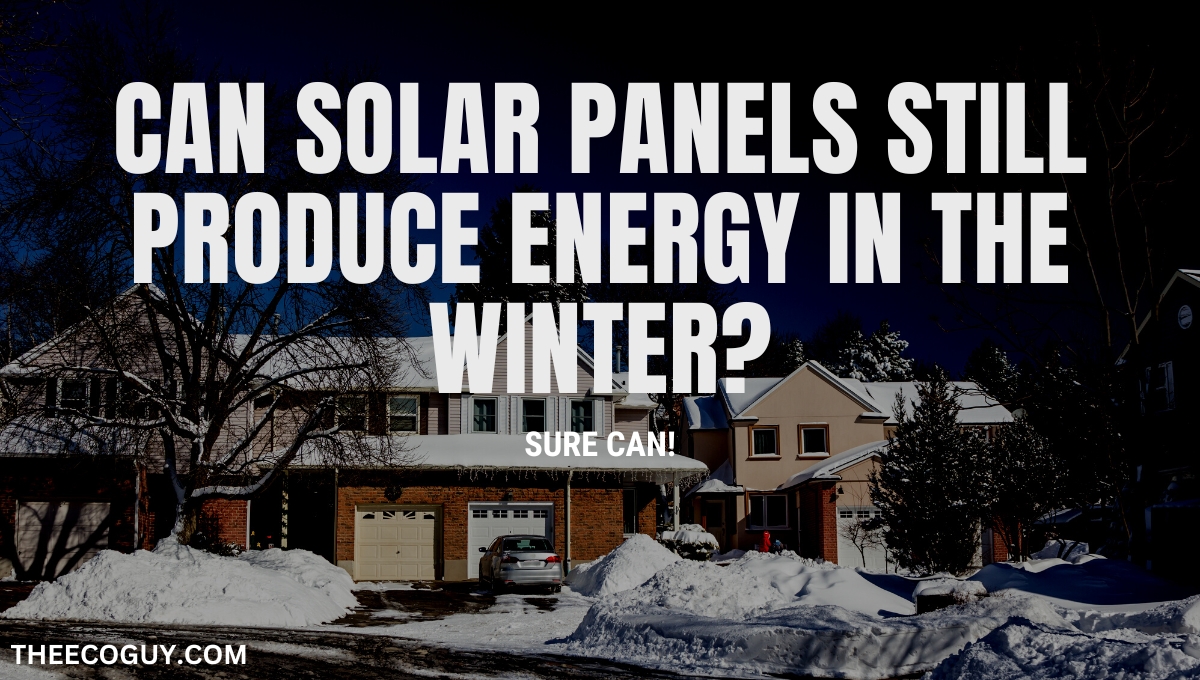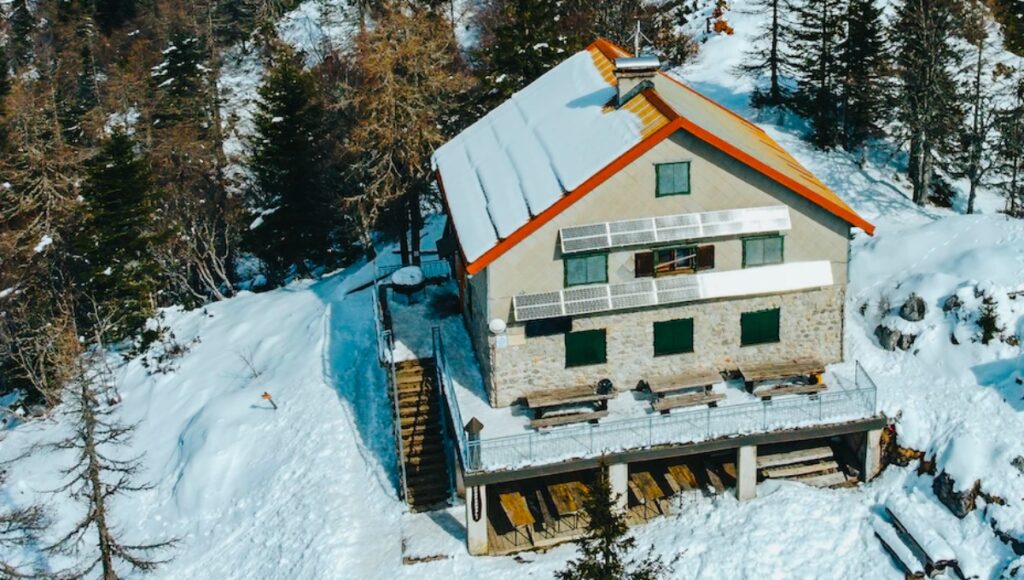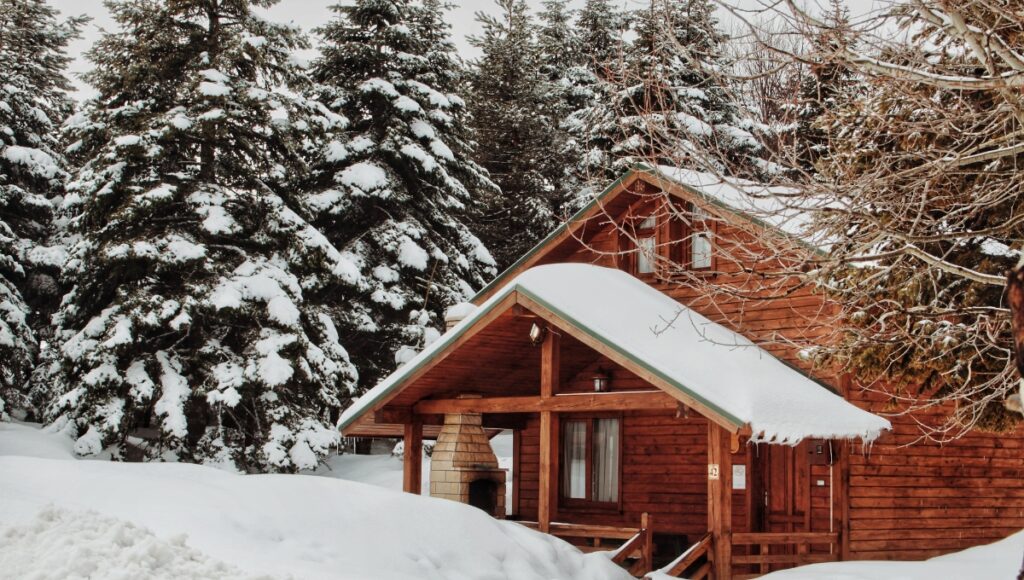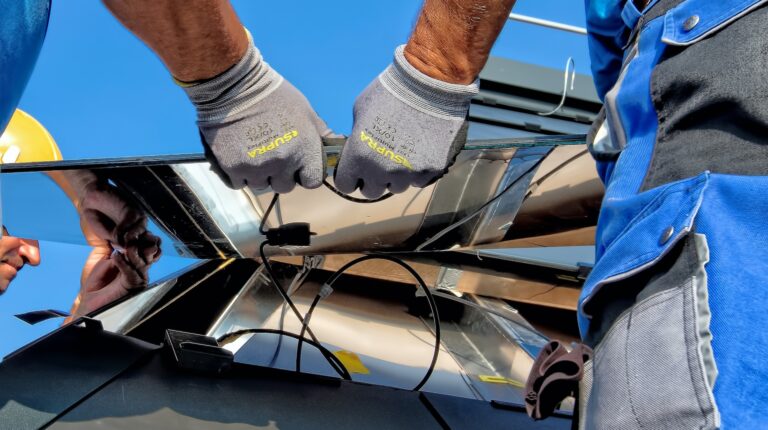Can Solar Panels Still Produce Energy in the Winter? (Sure Can!)

If you experience winter weather, the thought of whether your solar panels will continue to generate energy during those frigid months may have crossed your mind.
Solar panels still produce energy in the winter, however, their efficiency is lower due to the shorter days and less sunlight. While solar panels still generate some energy during winter months, the output of your system will be significantly lower compared to other seasons.
To increase output during the winter, you can install a tracking system that keeps your solar panel array facing toward the sun. You can also purchase a panel with higher efficiency and dual-tracking technology to maximize energy production, even in cold weather.
In this article, we’ll look further into solar’s efficiency in the winter, and explain how you can maintain the highest-possible output in your system. We’ll also discuss how temperature affects solar panel performance and what kind of maintenance is necessary during the winter months. Hopefully, this will give you a better understanding of how to get the best out of your solar setup regardless of seasonal fluctuations!
How Does Solar Panel Technology Work?
Solar panel technology is a clean and renewable energy source that has been gaining popularity in recent years. Solar panels use photovoltaic cells to convert sunlight into direct current (DC) electricity, which can then be converted into alternating current (AC) for household use.
This process occurs when photons from the sun are absorbed by the photovoltaic cell, generating an electrical charge within it. The charge carriers then move toward opposite sides of the cell, creating an electric field across its surface.
This electric field produces a flow of electrons which creates an electrical circuit and generates electricity.
By connecting multiple solar cells in a series or parallel configuration, more power can be generated from larger arrays of solar cells known as photovoltaic modules or solar panels.
How Do Winter Conditions Affect Solar Panel Performance?
The amount of electricity that your solar panel can generate is largely dependent on the amount of sunlight it receives. This means that when there’s less sunshine in the winter months, you’ll get a lower output from your system.
In addition to decreased sunlight, cold temperatures can also affect a solar panel’s performance. With the decrease in temperature, the photovoltaic cells become less efficient and are unable to absorb as much light energy.
This means that even when there is plenty of sunshine, your system may not generate as much electricity as it would under normal environmental conditions.

How Can You Maximize Efficiency During the Winter?
Although output may be lower in winter months, there are ways you can maximize the efficiency of your solar system.
One method is to install a tracking system that keeps your panels facing toward the sun throughout the day. This allows them to take maximum advantage of available sunlight and capture more energy than if they were fixed in place.
You can also purchase a panel with higher efficiency and dual-tracking technology which helps to maximize energy production, even in cold weather conditions.
Finally, it is important to ensure that your solar panels are clean and free from debris or snow. This will help them absorb more light and increase their efficiency.
What Benefits Can Solar Power Provide During Winter?
The benefits of solar during winter months are clear. Not only does it reduce electricity bills and provide energy independence, but it can also be a source of clean and renewable energy.
Solar panels generate power from the sun’s rays, meaning that they don’t emit any harmful gases or pollutants into the atmosphere. This makes them an environmentally-friendly alternative to traditional energy sources.
What Challenges to Solar Panel Production Exist During Winter?
One of the main challenges to solar panel production during winter months is a decrease in efficiency due to low temperatures and reduced sunlight.
In addition, icy or snowy conditions can also affect performance by blocking light from reaching the panels. This is why it’s important to make sure that your system is regularly maintained and kept clean throughout the winter months.
Despite these challenges, solar panels can still be a great source of energy during the winter months and provide you with reliable, clean electricity when needed. With proper maintenance and installation, you can continue to reap the benefits of our solar setup regardless of seasonal fluctuations!
What Impact Does the Decrease in Sunlight Hours and Intensity Have on Energy Production?
The decrease in hours and intensity of sunlight during winter months has a direct impact on energy production.
As the amount of solar radiation reaching your panels is reduced, it reduces their ability to generate electricity. This means that your system will produce less energy than it would under normal environmental conditions.

How Is Panel Efficiency Affected by Temperature Drops, Snowfall, and Other Winter Conditions?
As temperatures drop, the efficiency of solar panels decreases. This is because photovoltaic cells are less efficient in colder weather and are unable to absorb as much light energy.
Snowfall can also affect performance by blocking light from reaching the panels, so it’s important to make sure that your system is regularly maintained and kept clean throughout the winter months. Other winter conditions, such as freezing rain and hail, can also damage panels and affect performance.
Are There Different Panel Materials or Sizes That Work Better for Winter Climates?
Yes, there are different panel materials and sizes that are designed for winter climates. For example, thin-film solar panels are better suited for cold temperatures as they don’t need to absorb as much light energy to produce electricity.
In terms of size, larger panels are better for winter climates as they have more surface area to absorb the available sunlight. This makes them more efficient at producing energy in low-light conditions.
Are There Other Strategies That Can Help Improve Winter Efficiency?
Yes, there are strategies that can help improve the efficiency of solar panels in winter climates. For example, you can install an energy storage system to ensure a steady supply of power even when sunlight is sparse.
You can also purchase a panel with higher efficiency and dual-tracking technology which helps to maximize energy production, even in cold weather conditions. It is also important to ensure that your solar array is positioned correctly to maximize the amount of sunlight it receives.
What Methods Can Be Used to Proactively Maintain and Monitor Panel Efficiency in Winter Climates?
Regular maintenance and monitoring are key to ensuring your solar panels remain efficient during the winter months. This includes cleaning them regularly, checking for any damage or leakage, and making sure they’re correctly aligned to maximize their performance.
You can also use energy-monitoring tools such as an inverter monitor to keep track of your system’s performance and make sure it’s producing energy as efficiently as possible. This will help you identify any potential issues that might be affecting your system’s efficiency.
Are There Any Government Incentives Available for Utilizing Solar Power During the Winter Months?
Yes, there are several government incentives available for utilizing solar power in winter months. These can include tax credits and other financial incentives that reduce your upfront costs and help you save money on your energy bill.
What Additional Steps Can Homeowners Take To Ensure Maximum Energy Efficiency During Cold Months?
Homeowners can take several additional steps to ensure maximum energy efficiency during the cold months. These include installing a high-performance panel system, taking advantage of government incentives, and regularly monitoring and maintaining their solar array.
It’s also important to make sure that your system is properly sized for your home’s energy needs and that it’s positioned to maximize its efficiency. Taking these steps will help you ensure that your system can produce as much energy as possible during the winter months.
Final Thoughts
In closing, solar panels can still produce energy in the winter months but it is important to take proactive steps such as installing a high-performance system and regularly monitoring and maintaining your array.
Additionally, several government incentives may be available to help reduce upfront costs and increase efficiency during cold weather conditions.
With these strategies in place, you can ensure that your solar panel system will perform at its best throughout the entire year.







